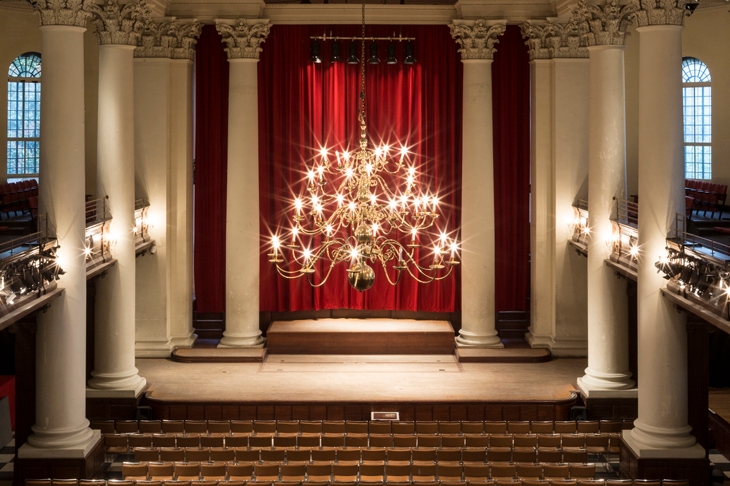Playing in an orchestra that disintegrates mid-concert is not an experience you forget. One moment everything’s motoring along nicely. Suddenly a harmony doesn’t quite fit, the soloist enters on the wrong beat: it doesn’t matter, because before you can work out what to do next the confusion spreads, the conductor signals frantically and with a pit-of-the-stomach lurch the floor drops out of the music and you’re all sat there facing the audience amid the one sound that no one present has paid to hear: mortified silence.
The Aurora Orchestra has worked out a way to monetise that sensation. Well, maybe that’s putting it a bit cynically. But if every orchestral performance is a tightrope walk, they’ve very publicly dispensed with their single biggest safety net, and taken to playing full-length symphonies entirely from memory: Mozart’s 40th at the 2014 Proms, Beethoven more recently, and now — upping the ante considerably — Brahms’s First.
So what? Concerto soloists play from memory all the time. But that’s just one player. The Aurora Orchestra’s feat is entirely dependent on every player remembering not just their own part but how it interlocks, over a 45-minute span of music, with up to 23 other musical lines. And although their conductor Nicholas Collon insists that the rationale is purely artistic — about being ‘unshackled from the physical and metaphorical confines of the printed notes’, as he puts it — the potential for disaster is horribly compelling. The crowds that watched Evel Knievel jump Snake River Canyon surely never expected him to reach the other side.
But yes, the Aurora Orchestra made the leap: a red-blooded, extrovert performance that thundered at the opening, blazed at the finish and delivered quite a few cherishable moments in between. I was watching through my fingers in the opening bars — when you’re used to conventional orchestras, the sight of the players standing on stage without music stands is nerve-shredding. They were into the first Allegro before I really managed to listen properly, though they’re certainly watchable. The musicians sway. They turn, smiling, towards an oboist or horn player as they take a solo line, and share little glances of determination or relief as a particularly stormy passage is approached and triumphantly surmounted. Even with Collon conducting (without a score, naturally), it was like watching a chamber group.
It wasn’t quite like hearing one, though. The playing gained in assertiveness rather than finesse — there weren’t many pianissimos and the final C major celebration was positively raucous, which may have been overcompensation for the church acoustic. But who could blame them? There’s something very wrong with any account of Brahms’s First Symphony that isn’t either frightening or intoxicating, and there was something very right about the raw immediacy of this one. The emotion seemed to arc straight from the stage into the audience; the final ovation was instantaneous.
Earlier, they’d got the crowd on side with a performance (definitely not from memory) of Richard Ayres’s No.42 (In the Alps). It’s a surreal, disingenuous collage of Alpine clichés from William Tell to Mahler, accompanying the whimsical tale (told through magic-lantern slides) of a lederhosen-clad trumpeter (Christopher Deacon) and a girl raised by goats — the soprano Mary Bevan, wearing what looked like a dead polecat and gamely bleating, whistling and yodelling on demand. Funny and feather-light, it’s the sort of contemporary music that audiences actually seem to enjoy, which is probably why we don’t hear Ayres in the UK that often.
In Manchester both the city’s symphony orchestras, the Hallé and the BBC Philharmonic, somehow squeezed themselves, three choruses and six soloists on to the platform of the Bridgewater Hall for Schoenberg’s Gurrelieder — the vast youthful cantata that makes Mahler’s Eighth look like the Tritsch-Tratsch Polka and which threw its composer into a huff when the Viennese preferred it to his later, shall we say, less tuneful stuff. Sir Mark Elder conducted it with the same combination of sculpted grandeur and sensitivity to his singers that make him one of our supreme living Wagnerians. Plus: 11 horns! Four harps! Percussionists jangling chains! Elder didn’t stint on the colour, though in the biggest climaxes everything simply merged into a single ear-splitting blast.
What lingered wasn’t so much the splendour of the sound, or even the heroic singing of Brandon Jovanovich as Waldemar, but the poetic expression and rich, pure tone of Alice Coote in her brief appearance as the Wood Dove. And then Sir Thomas Allen, delivering the sprechgesang of his final narration so tenderly that it managed to charge Schoenberg’s Technicolor final sunrise with genuine meaning. At the start, Allen had spoken briefly about the previous night’s atrocities in London. With Ariana Grande’s concert taking place just across the city that same evening, this was an occasion when even Gurrelieder signified something more than just a big noise.






Comments